Award-Winning Tutors
Who needs tutoring?
FEATURED BY
TUTORS FROM
- YaleUniversity
- PrincetonUniversity
- StanfordUniversity
- CornellUniversity
Find Expert Tutors Nationwide
Browse tutors by location, subject, or university

Dakota
I am a native Texan now living in NYC. I just finished my Master's degree, and I love food, reading, and travel. I've been working and volunteering as a tutor since my high school days, and I am eager to provide advanced-level assistance to you! I'm a friendly, approachable person who maintains a professional but fun learning atmosphere. And, most importantly, we get hard work done!
Education & Certifications
ACT SCORES
Composite: 33
English: 36
Math: 31
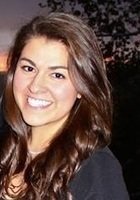
Mary
I am a 2014 graduate of Cornell University's College of Engineering where I earned a Bachelor's Degree in Biological Engineering. I have just begun my Master's Degree in Biomedical Engineering at Drexel University. My favorite subjects to tutor include Test Prep and elementary/middle school subjects. I enjoy helping younger students so that they can be excited about learning and begin their education with a solid foundation in reading, writing, and mathematics. I believe it is important to provi...
Education & Certifications
ACT SCORES
Composite: 32
English: 35
SAT SCORES
Composite: 1430
Math: 710
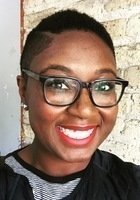
Brittney
I'm a graduate of Princeton University (2009), with a degree in Comparative Literature. I'll be receiving my masters degree in English from Grand Valley State University this fall and I'm looking forward to working with students like you! I've been teaching and tutoring students since 2008 and I specialize in English, Reading, Writing, Essays, and College Entrance Test Prep.
Education & Certifications
SAT SCORES
Composite: 1440
Verbal: 730

Meghan
I am a 2015 graduate of Northwestern University, with an undergraduate journalism major/Spanish minor and a graduate degree in journalism. During my time at NU, I spent a semester at Madrid's top-ranked university, taking upper-level history and literature courses with Spanish students. I now work at a trade magazine in Midtown covering real estate.
Education & Certifications
SAT SCORES
Composite: 1520
Math: 720
Verbal: 780

Peter
I'm looking forward to helping your student find personal success in their academic lives!
Education & Certifications
SAT SCORES
Composite: 1470
Verbal: 700
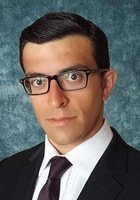
Michael
I am currently a fourth year medical student at the Albert Einstein College of Medicine, and graduated Suma Cum Laude from Yeshiva College with a BA in Biology and Music. As a Writing Center tutor, I worked with undergraduate and graduate students looking to improve their writing, and have also tutored Regents-level biology and chemistry. Most recently, I tutored for Kaplan, teaching an MCAT preparatory course and working one-on-one with students. When not studying, I like to ride my bike, train...
Education & Certifications
ACT SCORES
Composite: 34
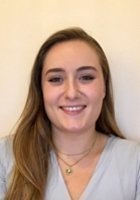
Mimi
I am an interdisciplinary educator with an Ed.M. from the Harvard Graduate School of Education and a B.A. from Dartmouth College. My background is primarily in integrated arts learning and museum education and I specialize in visual arts, history and art history, and object-based learning. In all subjects, I take a creative, inquiry-based and learner-centered approach, designing opportunities for each unique individual to meet their learning goals.
Education & Certifications
SAT SCORES
Composite: 1560
Math: 750
Verbal: 800

Keith
I am a recent graduate of Williams College, where I studied political science with sidelines in history and English. Next fall, I am headed to Ithaca to study at Cornell Law School. I have experience tutoring in all subjects for high school standardized tests and in writing and history at higher levels, and am excited to pass on the benefits of my study as a tutor for the LSAT. I look forward to working with you!
Education & Certifications
SAT SCORES
Composite: 1560
Math: 790
Verbal: 760
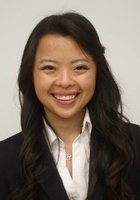
Annie
I am currently a second year medical student. I was a Physiological Sciences major at UCLA (class of 2015), and pursued research during my gap year between undergrad and medical school.
Education & Certifications
SAT SCORES
Composite: 1540
Math: 800
Verbal: 700

Li
I'm extremely motivated to help you succeed
Education & Certifications
SAT SCORES
Composite: 1480
Math: 770
Browse Tutors by State
- Alabama Tutors
- Alaska Tutors
- Arizona Tutors
- Arkansas Tutors
- California Tutors
- Colorado Tutors
- Connecticut Tutors
- Delaware Tutors
- District of Columbia Tutors
- Florida Tutors
- Georgia Tutors
- Hawaii Tutors
- Idaho Tutors
- Illinois Tutors
- Indiana Tutors
- Iowa Tutors
- Kansas Tutors
- Kentucky Tutors
- Louisiana Tutors
- Maine Tutors
- Maryland Tutors
- Massachusetts Tutors
- Michigan Tutors
- Minnesota Tutors
- Mississippi Tutors
- Missouri Tutors
- Montana Tutors
- Nebraska Tutors
- Nevada Tutors
- New Hampshire Tutors
- New Jersey Tutors
- New Mexico Tutors
- New York Tutors
- North Carolina Tutors
- North Dakota Tutors
- Ohio Tutors
- Oklahoma Tutors
- Oregon Tutors
- Pennsylvania Tutors
- Puerto Rico Tutors
- Rhode Island Tutors
- South Carolina Tutors
- South Dakota Tutors
- Tennessee Tutors
- Texas Tutors
- Utah Tutors
- Vermont Tutors
- Virginia Tutors
- Washington Tutors
- West Virginia Tutors
- Wisconsin Tutors
- Wyoming Tutors
Top 50 Cities
- New York Tutors
- Los Angeles Tutors
- Chicago Tutors
- Miami Tutors
- Dallas Tutors
- Philadelphia Tutors
- Houston Tutors
- Atlanta Tutors
- Washington Tutors
- Boston Tutors
- Phoenix Tutors
- Seattle Tutors
- San Francisco Tutors
- Detroit Tutors
- San Diego Tutors
- Minneapolis Tutors
- Tampa Tutors
- Denver Tutors
- Brooklyn Tutors
- Queens Tutors
- Riverside Tutors
- Baltimore Tutors
- Las Vegas Tutors
- Portland Tutors
- San Antonio Tutors
- St. Louis Tutors
- Sacramento Tutors
- Orlando Tutors
- San Jose Tutors
- Cleveland Tutors
- Pittsburgh Tutors
- Austin Tutors
- Cincinnati Tutors
- Kansas City Tutors
- Manhattan Tutors
- Indianapolis Tutors
- Columbus Tutors
- Charlotte Tutors
- Virginia Beach Tutors
- Bronx Tutors
- Milwaukee Tutors
- Providence Tutors
- Jacksonville Tutors
- Salt Lake City Tutors
- Nashville Tutors
- Richmond Tutors
- Memphis Tutors
- Raleigh Tutors
- New Orleans Tutors
- Louisville Tutors
Browse by Subject Category
- Art Tutors
- Business Tutors
- English Tutors
- Graduate Test Prep Tutors
- Languages Tutors
- Law Tutors
- Learning Differences Tutors
- Math Tutors
- Medicine Tutors
- Music Tutors
- Professional Certifications Tutors
- Science Tutors
- Social Sciences Tutors
- Social Studies Tutors
- Technical Certifications Tutors
- Technology and Coding Tutors
Top 20 Subjects
- SAT Tutors
- Japanese Tutors
- AP Calculus AB Tutors
- Executive Functioning Tutors
- Orton Gillingham Tutors
- ACT Tutors
- Conversational Spanish Tutors
- MCAT Tutors
- GRE Tutors
- LSAT Tutors
- SAT Math Tutors
- Organic Chemistry Tutors
- Elementary School Reading Tutors
- Calculus Tutors
- Algebra Tutors
- High School Chemistry Tutors
- Pre-Calculus Tutors
- Middle School Math Tutors
- Geometry Tutors
- Elementary School Math Tutors
Top 20 Universities
- Cornell University Tutors
- New York University Tutors
- The University of Texas at Austin Tutors
- Arizona State University Tutors
- Washington University in St. Louis Tutors
- University of Pennsylvania Tutors
- Northwestern University Tutors
- Columbia University Tutors
- Johns Hopkins University Tutors
- Yale University Tutors
- Vanderbilt University Tutors
- University of Central Florida Tutors
- Rutgers University Tutors
- University of Michigan Tutors
- University of Chicago Tutors
- Duke University Tutors
- Boston University Tutors
- Rice University Tutors
- University of South Florida Tutors
- Harvard University Tutors
Find The Best Tutors
Connect with expert tutors tailored to your learning needs